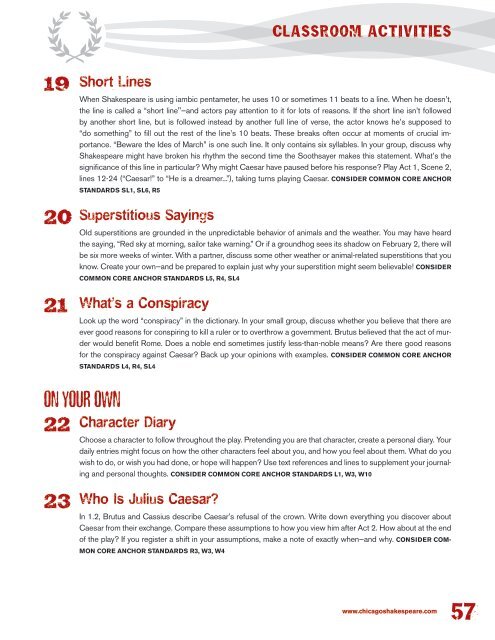Julius Caesar • 2013 - Chicago Shakespeare Theater
Julius Caesar • 2013 - Chicago Shakespeare Theater
Julius Caesar • 2013 - Chicago Shakespeare Theater
Create successful ePaper yourself
Turn your PDF publications into a flip-book with our unique Google optimized e-Paper software.
19<br />
20<br />
21<br />
Short Lines<br />
CLASSROOM ACTIVITIES<br />
When <strong>Shakespeare</strong> is using iambic pentameter, he uses 10 or sometimes 11 beats to a line. When he doesn’t,<br />
the line is called a “short line"—and actors pay attention to it for lots of reasons. If the short line isn’t followed<br />
by another short line, but is followed instead by another full line of verse, the actor knows he’s supposed to<br />
“do something” to fill out the rest of the line’s 10 beats. These breaks often occur at moments of crucial importance.<br />
“Beware the Ides of March” is one such line. It only contains six syllables. In your group, discuss why<br />
<strong>Shakespeare</strong> might have broken his rhythm the second time the Soothsayer makes this statement. What’s the<br />
significance of this line in particular? Why might <strong>Caesar</strong> have paused before his response? Play Act 1, Scene 2,<br />
lines 12-24 (“<strong>Caesar</strong>!” to “He is a dreamer...”), taking turns playing <strong>Caesar</strong>. CONSIDER COMMON CORE ANCHOR<br />
STANDARDS SL1, SL6, R5<br />
Superstitious Sayings<br />
Old superstitions are grounded in the unpredictable behavior of animals and the weather. You may have heard<br />
the saying, “Red sky at morning, sailor take warning.” Or if a groundhog sees its shadow on February 2, there will<br />
be six more weeks of winter. With a partner, discuss some other weather or animal-related superstitions that you<br />
know. Create your own—and be prepared to explain just why your superstition might seem believable! CONSIDER<br />
COMMON CORE ANCHOR STANDARDS L5, R4, SL4<br />
What’s a Conspiracy<br />
Look up the word “conspiracy” in the dictionary. In your small group, discuss whether you believe that there are<br />
ever good reasons for conspiring to kill a ruler or to overthrow a government. Brutus believed that the act of murder<br />
would benefit Rome. Does a noble end sometimes justify less-than-noble means? Are there good reasons<br />
for the conspiracy against <strong>Caesar</strong>? Back up your opinions with examples. CONSIDER COMMON CORE ANCHOR<br />
STANDARDS L4, R4, SL4<br />
ON YOUR OWN<br />
22<br />
23<br />
Character Diary<br />
Choose a character to follow throughout the play. Pretending you are that character, create a personal diary. Your<br />
daily entries might focus on how the other characters feel about you, and how you feel about them. What do you<br />
wish to do, or wish you had done, or hope will happen? Use text references and lines to supplement your journaling<br />
and personal thoughts. CONSIDER COMMON CORE ANCHOR STANDARDS L1, W3, W10<br />
Who Is <strong>Julius</strong> <strong>Caesar</strong>?<br />
In 1.2, Brutus and Cassius describe <strong>Caesar</strong>’s refusal of the crown. Write down everything you discover about<br />
<strong>Caesar</strong> from their exchange. Compare these assumptions to how you view him after Act 2. How about at the end<br />
of the play? If you register a shift in your assumptions, make a note of exactly when—and why. CONSIDER COM-<br />
MON CORE ANCHOR STANDARDS R3, W3, W4<br />
www chicagoshakespeare com 57




